-
Public Comments on Regulatory Review (Treasury, GSA, FEMA, State, DOJ, FCA, Interior)
Many federal agencies are requesting the public’s suggestions for rules to repeal or reform, tacitly implying that most regulations stifle economic growth. In comments to several agencies, we argue that regulatory review should consider the public benefits of regulation, not just the costs to regulated industries, and should prioritize review of rules for which actual costs and benefits diverge significantly from predicted costs and benefits.
-
Public Comments on the Review of National Monuments
We recently submitted comments to the Department of the Interior on their review of certain national monuments established since 1996. The review process was initiated by Executive Order 13792, which directs the Secretary of the Interior to review all national monuments designated or expanded after January 1, 1996, that either include more than 100,000 acres of public lands or for which the Secretary determines inadequate “public outreach and coordination with relevant stakeholders” occurred.
-
Comments to the Office of Natural Resources Revenue on the Reform Rule
We recently submitted two sets of comments to the Office of Natural Resources Revenue (ONRR), making the case against repealing an Obama-era reform that promised to recover millions of dollars in royalties from mining companies—a reform that would have ensured that taxpayers receive fair market value for the use of public lands. Our first set of comments objects to the proposed repeal of the Consolidated Federal Oil & Gas and Federal & Indian Coal Valuation Reform Rule (the “Reform Rule”), while our second set responds to ONRR’s request for comments on whether revisions are necessary to the regulations governing coal, oil, and gas royalties. We previously submitted comments to ONRR on the proposed Reform Rule.
-
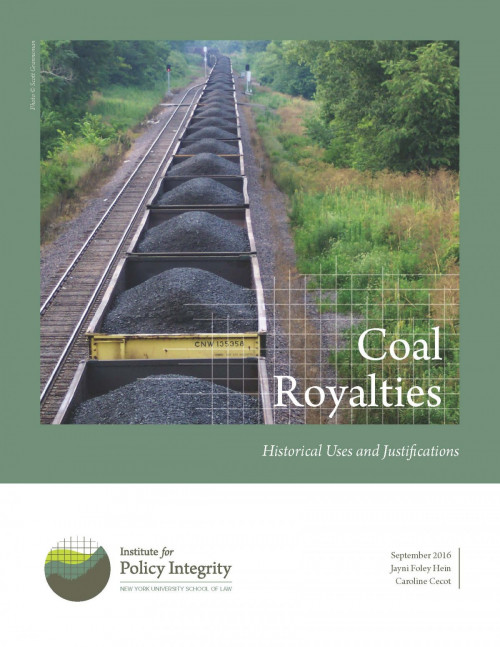
Coal Royalties
Historical Uses and Justifications
Royalties have been used as a policy lever to influence behavior and meet national goals for centuries. For example, royalties have been set at specific rates in order to: encourage resource production; encourage westward expansion; maintain the incentive to create new inventions; and deter socially undesirable behavior, to name just a few. This report concludes that it would be reasonable for Interior to adjust coal royalty rates to account for negative externalities that are not otherwise addressed by regulation. Historical uses, accepted economic justifications, legislative history, and examples of royalty use by private actors and in other industries discussed in the paper all support the determination that it would be reasonable for Interior to increase coal royalty rates to account for externality costs and to better align the federal coal program with national climate change priorities.
-
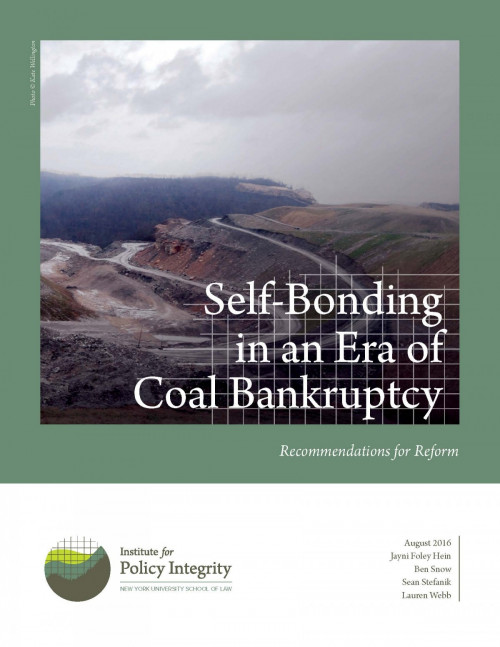
Self-Bonding in an Era of Coal Bankruptcy
Recommendations for Reform
Federal law requires coal companies to reclaim and restore land and water resources that have been degraded by mining. But at many sites, reclamation occurs slowly, if it all. Mining companies are required to post performance bonds to ensure the successful completion of reclamation efforts should they become insolvent, but regulators have discretion to accept “self-bonds,” which allow many companies to operate without posting any surety or collateral. As the coal industry experiences financial distress and coal companies declare bankruptcy, the viability of future reclamation work is endangered. This report offers recommendations to help regulators better assess coal companies’ financial health and take steps to curtail self-bonding.
-
Hein Testifies at House Hearing on Offshore Leasing
On July 6, Jayni Hein testified at a House Natural Resources Committee hearing on the “Innovation in Offshore Leasing Act.” The hearing, held by the Subcommittee on Energy and Mineral Resources, focused on H.R. 5577, a bill that would amend the Outer Continental Shelf Lands Act to allow internet-based offshore oil and gas lease sales, among other measures. Hein’s testimony covered four main topics, suggesting that the Department of the Interior should: continue to increase transparency and public participation in the offshore leasing process; improve the regulations that underlie the Bureau of Ocean Energy Management’s (BOEM’s) five-year planning process; build on recent progress addressing environmental, social, and economic uncertainty in its five-year Program and lease sales; and advance efforts to account for the environmental and social costs of fossil fuel leasing through royalty rate and other fiscal reform. Hein’s testimony elaborated on some of the arguments from her recent Alaska Law Review article and recent comments to BOEM.
-
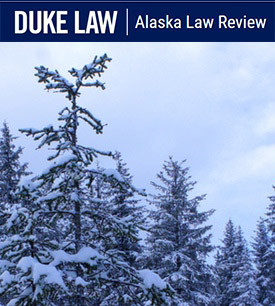
Next Steps to Reform the Regulations Governing Offshore Oil and Gas Planning and Leasing
Published in the Alaska Law Review
In this article, we argue that fundamental reform is necessary and highlight a series of key themes and topics that must be addressed to improve the regulatory process and promote better, more consistent management outcomes. While the article draws on examples from frontier areas-in particular the U.S. Arctic Ocean-the recommended changes would apply to and benefit all areas of the OCS.
-
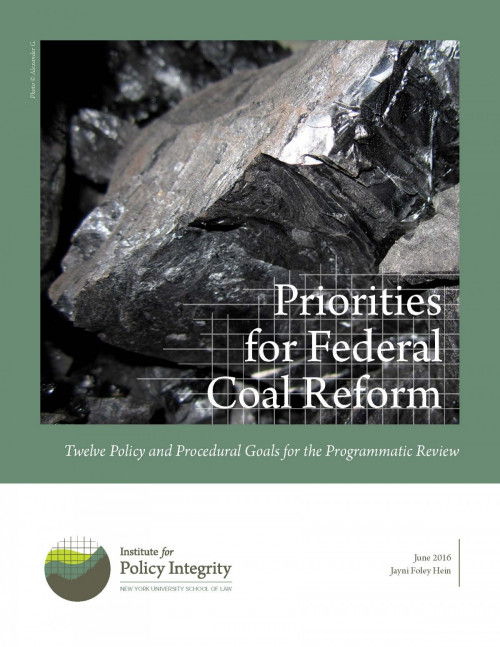
Priorities for Federal Coal Reform
Twelve Policy and Procedural Goals for the Programmatic Review
This report highlights twelve policy and procedural recommendations for the review of the federal coal program. These reforms are intended to help modernize program and so that it can provide maximum net benefits to American taxpayers. The programmatic review should identify opportunities to increase revenue, reduce greenhouse gas emissions, and align federal land management with U.S. climate change goals, paying enormous dividends to the public.
-
Comments on Proposed Offshore Leasing Program for 2017-2022
We recently submitted comments to BOEM in response to its proposed five-year offshore leasing program for 2017-2022. In its proposed program, BOEM qualitatively considers the option value, or informational value of delaying leasing until more information is available on relevant environmental, social, and technological uncertainties. In addition, BOEM will now consider environmental and social costs in its “hurdle price” analysis that helps determine whether and when to offer areas for lease. Building on this progress, we recommend that BOEM take additional steps to strengthen its analysis in line with best practices and OCSLA’s mandate to balance economic, social, and environmental values.
-
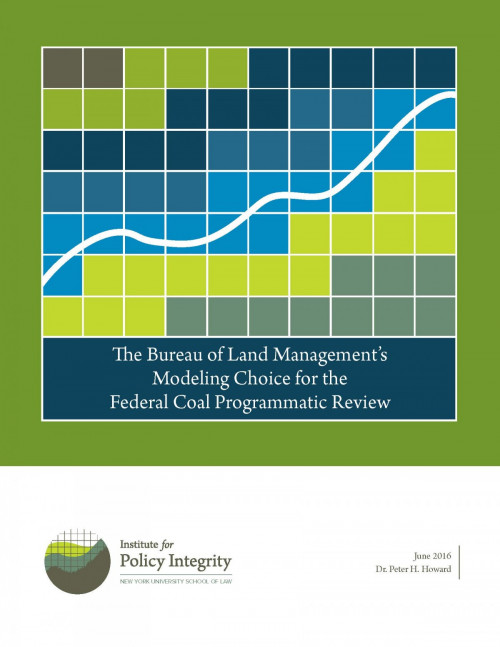
The Bureau of Land Management’s Modeling Choice for the Federal Coal Programmatic Review
There are multiple power sector models available to the Department of Interior (DOI)’s Bureau of Land Management (BLM) for analyzing the effect of current and alternative coal regulations and leasing policies during preparation of its programmatic environmental impact statement (PEIS). This document lays out model selection criteria to assist BLM in weighing the benefits and costs of these available models, and offers recommendations for model selection, highlighting the tradeoff between model complexity and transparency.
Viewing recent projects in Natural Resources
